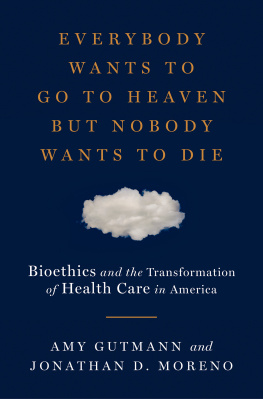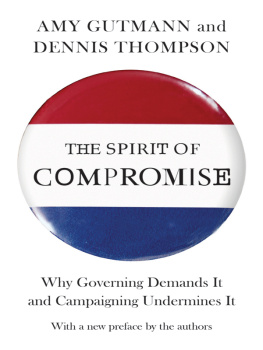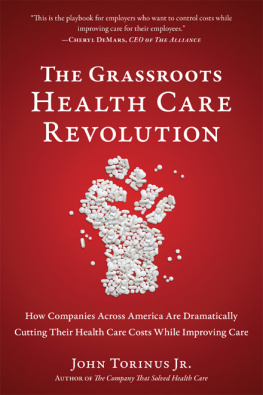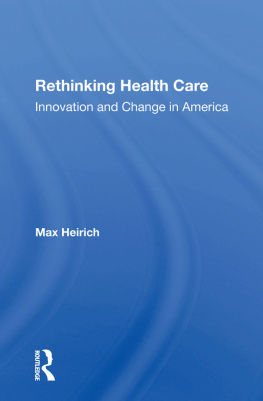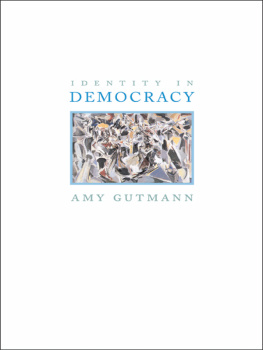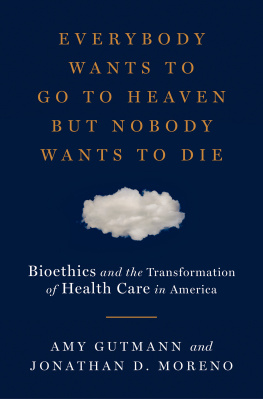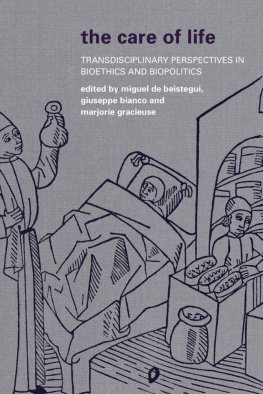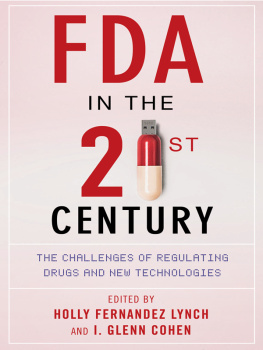Contents
Guide

ALSO BY AMY GUTMANN
The Spirit of Compromise:
Why Governing Demands It and Campaigning Undermines It
( WITH D ENNIS F. T HOMPSON )
Why Deliberative Democracy?
( WITH D ENNIS F. T HOMPSON )
Identity in Democracy
Color Conscious: The Political Morality of Race
( WITH K WAME A NTHONY A PPIAH )
Democracy and Disagreement
( WITH D ENNIS F. T HOMPSON )
Democratic Education
Liberal Equality
ALSO BY JONATHAN D. MORENO
Impromptu Man:
J. L. Moreno and the Origins of Psychodrama,
Encounter Culture, and the Social Network
Mind Wars:
Brain Science and the Military in the 21st Century
The Body Politic:
The Battle Over Science in America
Undue Risk:
Secret State Experiments on Humans
Deciding Together:
Bioethics and Moral Consensus
Ethics in Clinical Practice
( WITH J UDITH C. A RONHEIM AND C ONNIE Z UCKERMAN )
Discourse in the Social Sciences:
Strategies for Translating Models of Mental Illness
( WITH B ARRY G LASSNER )
EVERYBODY
WANTS TO GO
TO HEAVEN
BUT NOBODY
WANTS TO DIE

Bioethics and the Transformation
of Health Care in America
A MY G UTMANN
AND
J ONATHAN D. M ORENO

LIVERIGHT PUBLISHING CORPORATION
A DIVISION OF W. W. N ORTON & C OMPANY
Independent Publishers Since 1923
N EW Y ORK L ONDON
Copyright 2019 by Amy Gutmann and Jonathan D. Moreno
All rights reserved
First Edition
For information about permission to reproduce selections from this book,
write to Permissions, Liveright Publishing Corporation, a division of
W. W. Norton & Company, Inc., 500 Fifth Avenue, New York, NY 10110
For information about special discounts for bulk purchases, please contact
W. W. Norton Special Sales at specialsales@wwnorton.com or 800-233-4830
Book design by Lovedog Studio
Production manager: Julia Druskin
Library of Congress Cataloging-in-Publication Data is available
ISBN 978-0-87140-446-6
ISBN 978-1-63149-522-9 (ebook)
Liveright Publishing Corporation, 500 Fifth Avenue, New York, N.Y. 10110
www.wwnorton.com
W. W. Norton & Company Ltd., 15 Carlisle Street, London W1D 3BS
This book is dedicated in loving memory to our mothers,
Beatrice Gutmann and Zerka T. Moreno
CONTENTS
E verybody Wants to Go to Heaven, but Nobody Wants to Die is the title of an old blues song that captures the ironic way American society has come to view the afterlife, an ideal place where no one has to pay the price of achieving eternal perfection. In reality, though, our life choices test how much we are willing to pay. For health care, the stakes are high: longevity, the quality of life, and often life itself. When the stakes are so high only the best will do, but the best has to compete with all the expenses and other hard choices involved in getting the best.
To take the most glaring example, theres no limit on health care spending in the United States. We spend far more per capita on health care and medical science than any other society, an amount that continues to grow. If the results corresponded to the spending, there would be little reason to complain. Unfortunately, all that money hasnt made us the worlds healthiest countryfar from it. Compared to the populations of other high-income countries, Americans today have among the lowest life expectancy and the highest infant mortality. The United States spends about twice as much per capita on medical care as other affluent countries, providing insurance to a lower proportion of its population. American health care is inefficient and inequitable, the worst of both worlds.
Technological innovations coupled with other societal changes raise other hard questionsfor example, about new means of human reproduction and their implications for the well-being of children, as well as the liberty, responsibility, and sometimes even the identification of parents. The health and longevity for which we strive have never come without public controversy, while also creating tough choices among competing values. We must face up to the fact that spending more on health careboth as a society and as individualsmeans spending less on something else we value, like child care; elementary, secondary, or higher education; public or private transportation; housing; or discretionary quality-of-life goods and services. Those hard choices are inevitable, and the costs arent only financial. Whether exemplified by divides over universal health care insurance, investments in public health and mental health, new reproductive technologies, genetic engineering, end-of-life care, or organ donations, making health care choices for ourselves and our society tests our priorities, our moral values, and our willingness to work out our disagreements.
There are also rare and remarkable times when we actually serve up the best and dont feel any need to do tough thinking about trade-offs. As we were writing this book we were transfixed by the rescue of a Thai youth soccer team and their young assistant coach from the cave that flooded and trapped them for over two weeks. Hundreds of rescuers from around the world were mobilized, from Thai Navy Seals to an international group of volunteers. Once rescued, the team and coach were helicoptered to the nearest citys hospital quarantine for a week. No expense was spared; no knowledge or expertise untapped. A volunteer diver heroically lost his life early in the rescue operation.
What makes situations like these so exceptional? The life-and-death stakes are immediate. The lives are identifiable and we positively relate to them. We are conditioned to think fast rather than to think slow, as psychologist Daniel Kahneman puts it, springing into action, sparing no expense, and doing everything we can to come to the rescue. This happily turned out not to be a case of lifeboat ethics, which asks who should live if not all can be saved. Yet health care versions of lifeboat ethics occur daily in the United States and worldwide for thousands who hope they will be selected for a scarce, lifesaving organ and who are not so prominently identifiable.
Human psychology is geared to identifiable victims in need of rescue. Most of what produces the everyday health care we need, however, is the product of thinking slow and making the hard choices that bring about longer, healthier lives for everyone. Contrast the Thai rescue, where nobody questioned whether it was worth the all-in cost of rescuing thirteen people, to the U.S. Congresss unwillingness to fund health insurance for all Americans, and to what happens every day in the United States with respect to health care for millions of low-income, vulnerable residents of our country. How much health care spending in the United States is consumed by emergency room visits is a matter of debate (somewhere between 2 and 10 percent), but even if we knew the exact amount, would anyone want to deny true emergency care, even at the risk of some people using the ER for routine care? Going all out in emergency situations is a testament to human compassion, but routinely using the emergency room to care for millions of uninsured is evidence of a wasteful, inhumane health care system. We want to explore how in normal times, when the stakes are extremely high for millions of people but not so immediately obvious, we can ethically address health cares hard choices.

